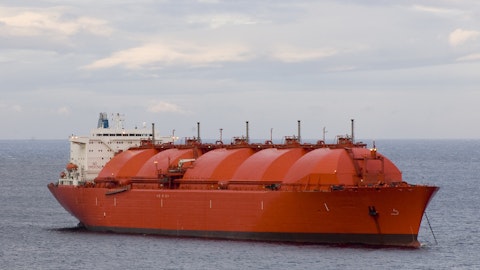Knut Traaholt: Then we have questions on — for finance and basically the recurring question on our cash piles. Why we are not repaying debt in order to reduce interest rate cost? It’s a recurring question and it’s something that we get and it’s related to the RCF, the revolving credit facility we have. Basically, we use the RCF for cash management. In between quarters we repay with available cash to bring down the interest cost, which is actually the question here. And that makes — we have cash available and funds available when we need it. And it follows up on the classical principles of raising capital when you can and have it available. So for this RCF, when we don’t utilize it, we pay 70 basis points in a commitment fee and that’s a pretty cheap way of having capital available. Following up on the market, a couple of questions there. We have Charles from Namohan (ph), short question, is the winter coming?
Oystein Kalleklev: Short answer is, yes. We are in August. Once we are getting into October, the winter will be coming. So what I think, he will be referring to maybe stick off when I show on the European storage levels of gas, of course, they are very high today, reflecting the fact the muted demand over the some — muted demand over last winter when we had a total La Nina (ph) and a Pidi warm or mild winter in Europe. What will happen this year? Let’s see. This year is different from the last three years. In the last three years, we have had La Nina. This year we have El Nino. El Nino typically means colder winters in North of Europe, wetter winters in South of Europe, usually warm winters in Asia. So even though inventory levels look high today, you have to also take into account that all the Russian gas that used to be there to support gas consumption in Europe is more or less gone.
So the storage is becoming much more important and the drawdown of the storage levels will probably be much quicker, especially in a cold winter, because you don’t have the same kind of base load of gas into the market. So, the winter will be coming. It will be interesting to see. We need to have as much LNG to the market as possible in order to not create this kind of wild price swings we have seen in the past.
Knut Traaholt: Yeah. So that brings us to another question from Sherif Al-Magaby. We have in the presentation deck and there is also in the news now about a potential strike in Australia. So what’s the impact on the ton-mile and there is a risk of a seaborne volume will drop and where will then the importers pick up the slack?
Oystein M. Kalleklev: Of course, this is so much volume. It’s unprecedented, the 10%, certainly of our volumes going away. We saw people to going away, it’s 3.5%. So if that is, volumes are curtailed, prices will skyrocket. It will not be enough LNG in the market for sure, and hopefully, you can only hope it will not be long-lasting. We have seen similar situation here in Norway where oil and gas workers have been contemplating striking. And actually, the government have intervened and said this — the consequences are too big. We are the biggest gas exports to Europe. We have a public arbitrator and just setting the term by Fiat (ph). I think, Australia so should certainly consider something similar. If it happens, of course, you will free up a lot of ships in Australia, which are usually doing that kind of transportation from Australia to Japan, Korea, China, Taiwan.
So [indiscernible] to see, all those ships will be available. 40 ships, if you multiply maybe 1.3, 1.4, it’s a sizable number of ships, maybe 60 ships will be available to market. Probably not will be available immediately, because people will be holding them back because they don’t know how long the strike will be. They cannot fix the ship on a three months or two months charter and suddenly the strike is over and they are left out of the ships. So, you will create inefficiencies and you will have ships going to longer routes to US, to Asia. And, I think actually shipping market will also be tight because the uncertainty about when will volumes come back. Of course, when Freeport shut down, they had like a timeline when the volumes would be starting up and people could re-let the ships.
When you have a strike, there’s more uncertainty. And in uncertainty, people will holding those ships. So I think LNG’s product market will be immensely tight and then the shipping market will also benefit. But there will not be a good situation and actually, I hope it not happen because we need LNG to stay at a cheaper level, if we are going to attract new consumers.
Knut Traaholt: And on top of that, we have the problems with the Panama Canal. So how is that affecting Flex and the LNG industry, in general?


